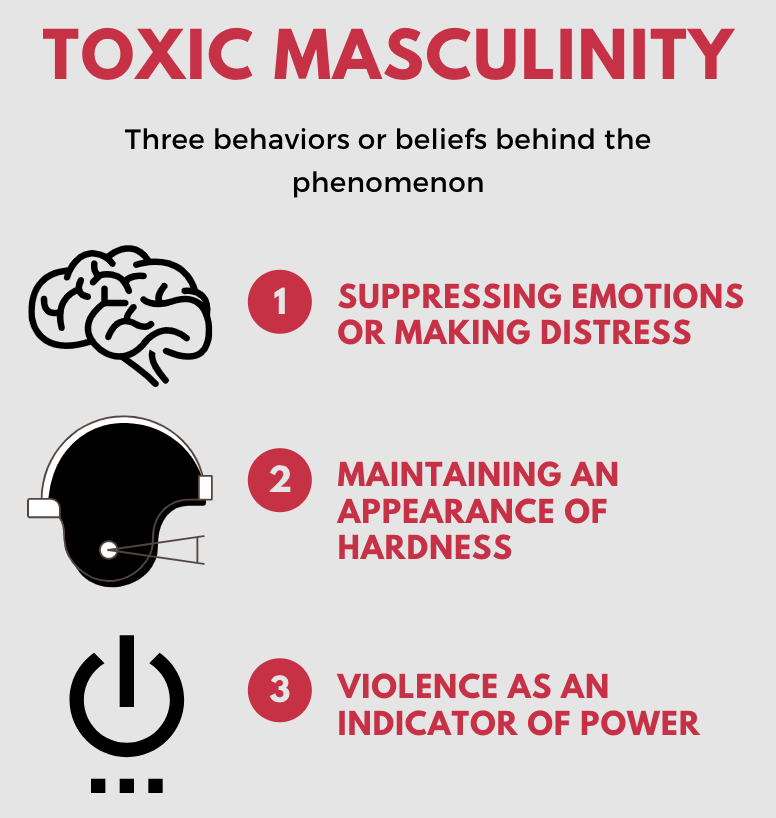Ending toxic masculinity
How we can change a negative concept ingrained in our culture
The reasons behind toxic masculinity according to the New York Times article “What Is Toxic Masculinity?”. Illustration by Anish Vasudevan
March 27, 2020
As I belted “Who Says” by Selena Gomez word for word in one of my classes last year, I looked around the classroom, seeing the surprised faces of the girls who were shocked that I was familiar with such a classic “girly” song. I continued looking around and saw one of my guy friends with a puzzled look on his face, telling me to change the song to something more up his alley like “Goosebumps” by Travis Scott.
I circled back around the classroom still singing the famous lines “I’m no beauty queen, I’m just beautiful me” and some of the girls started asking me questions about how I knew all these songs— they didn’t expect me to know this type of music.
The truth is, I got into this genre of songs through my older sister, who introduced me to artists like Taylor Swift, Selena Gomez and Bridgit Mendler at a very young age. I created a playlist titled “throwback tings” with some of the songs that my sister and I enjoyed and proceeded to play that during work time. Somehow, by queueing songs by those artists, I surprised the people around me and became known as someone who liked to listen to “feminine” music.
This was one of the first times in high school when I realized that some of the things I do or am interested in are not typical “masculine” things for a guy my age. As I grew older and started to spend time with more boys, I found myself listening to hardcore rap with artists bragging about how many guns they had and how tough they were instead of my usual soft love songs.
According to the New York Times, researchers have identified toxic masculinity as a mixture of boys doing the following three things: suppressing emotions or masking distress, maintaining an appearance of hardness and using violence as an indicator of power.
I definitely don’t have an issue with trying to appear tough all the time. The people closest to me know that I am a soft and emotional individual and that I cry very easily. But when I do cry about some anxiety in my life or the sad ending of a “Criminal Minds” episode, I feel guilty for some reason. I feel as though I’m being less of a man because I don’t have control over my emotions. I feel as though it’s my duty as a man to always look strong around others and never show signs of weakness.
Despite this problem of toxic masculinity still being prevalent, the solution seems quite apparent.
Every single person is a product of the environment around them. Most boys spend their time playing video games or sports with their friends — there really isn’t any time when us boys actually sit down and talk about the problems in our lives.
Boys have to be good at video games or sports, but ideally both. Video games themselves, especially first person shooter games, could add to toxic masculinity since they reward the stereotypical excessively-competitive nature of boys. I’m terrible at video games, which I blame on my lack of interest in them at a young age, but most of my friends have been playing all their lives.
I once tried Counter Strike with my friends months after they began playing, but as I struggled to catch up, I started to get more and more excluded from the gaming group. By constantly surrounding themselves in the violent environment of a video game, it makes sense that violence is a byproduct of emotional suppression.
In my friend group, only a few of us are vocal about our emotions and our struggles. It’s apparent that a lot of boys are still uncomfortable showing their emotions to each other. Those boys then just let all their emotions bottle up, eventually taking them out on other boys through violence in video games or sports. These can all end up causing communication or empathy issues for boys, which leads to ignorance and shouldn’t be overlooked.
In order for us to start taking steps to end toxic masculinity, the change needs to start within friend groups. If boys can be vulnerable around each other and discuss their emotions openly instead of suppressing them, this problem will inch closer to getting solved.
As high schoolers what we can do is make sure that we have serious discussions with our friends about what’s happening in their lives, and if we know that they’re struggling with something, we should check in with them as much as possible. More importantly, we should pick up our phones every day and ask our friends how their days went. This is a problem that affects all humans and until we can all create a positive environment in which boys feel comfortable with the uncomfortable, we can solve this problem for good.




























